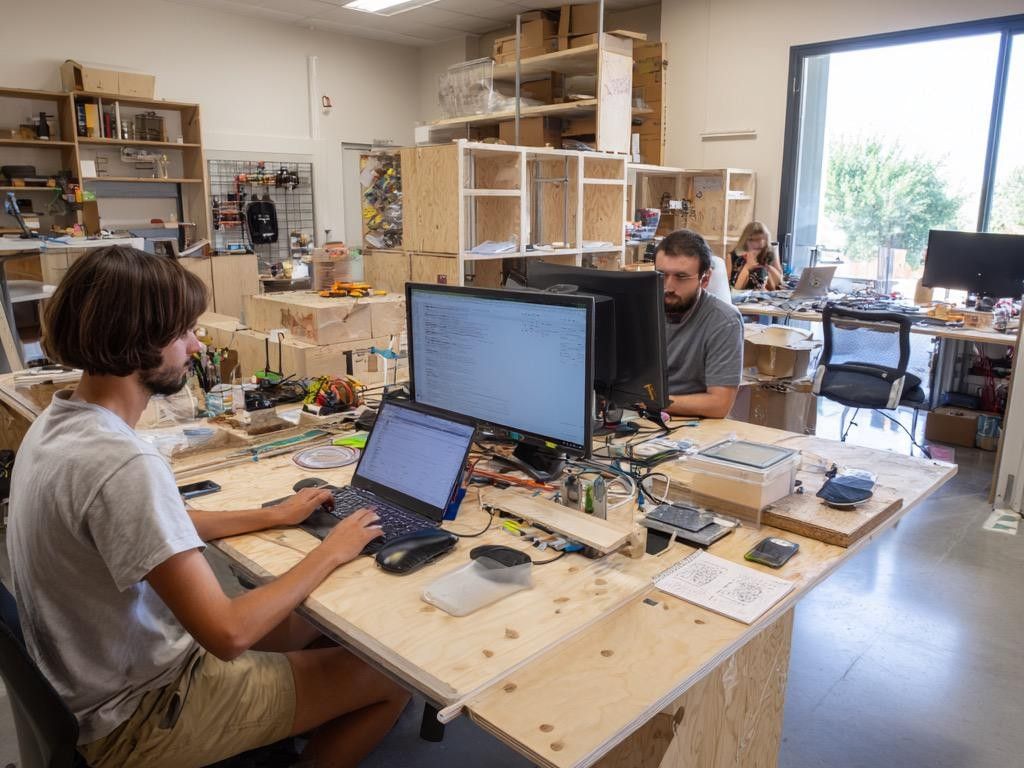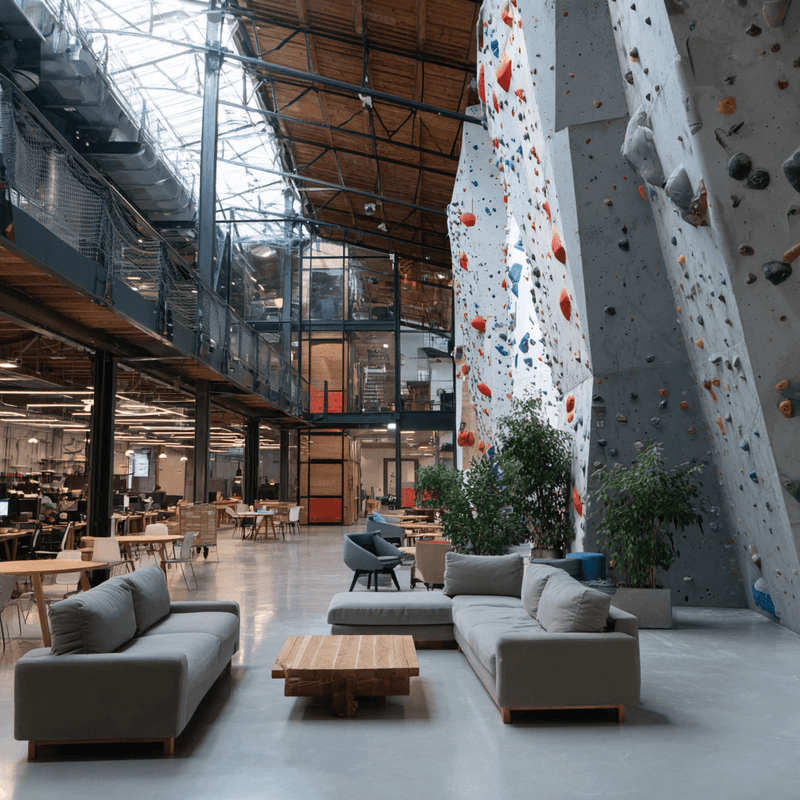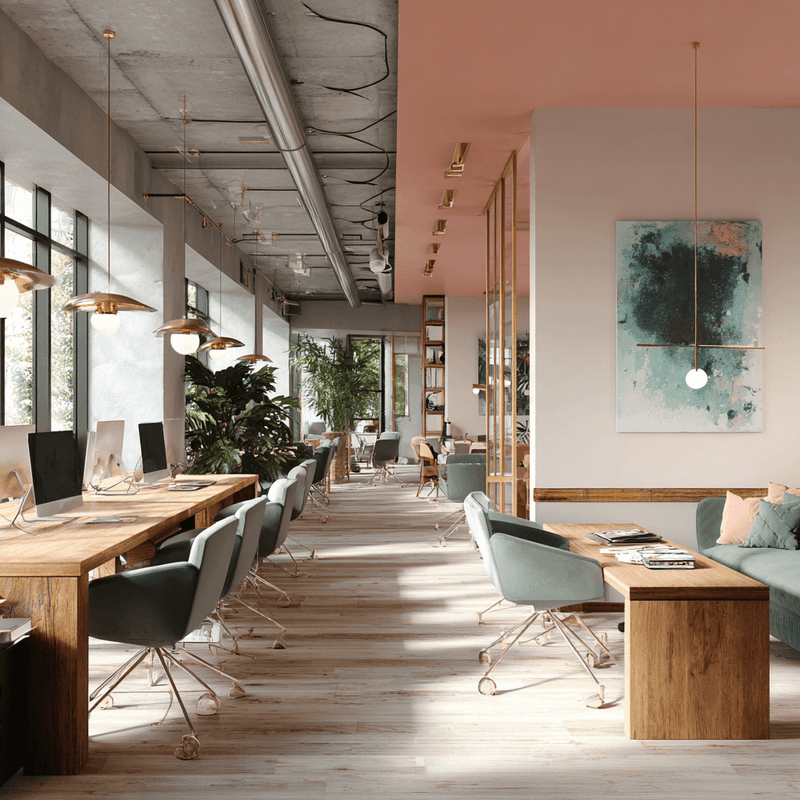
Inspired by the hackerspaces of the 1990s, shared offices have quickly become the big trend of the early 21st century. Much more than a simple fashion effect, coworking spaces and fablabs are confirming their role as the factory of the new world of work.
Workspace rethought: from shared offices to third places
For freelancers, entrepreneurs and startups, a coworking space can first of all meet the economic need to share the costs of professional premises. Indeed, the rent and the fitting out of a private room often represent a too high cost at the beginning of an activity, especially in town.
Therefore, thanks to shared offices, freelancers and small businesses can have access to a first address, work in a professional environment, have a real meeting room, and receive their clients as they should. Similarly, in a fablab, one benefits from the shared use of state-of-the-art machines, whose acquisition cost alone would be too high.
However, beyond the purely economic imperative, the new workspaces turn out to be much more than simple offices and tools shared at low cost. Born from the hackerspace movement in the 1990s, coworking spaces and fablabs are defined more as third places, where the border between competitive workplaces, convivial living spaces and collaborative creation workshops is blurred.
Coworking and fablabs also mean working differently
Why are large companies so interested in coworking and fablabs? L'Espace offers this breath of fresh air, this other necessary space where the lines of the new world of work can be improvised and freely drawn! Far from the hierarchical heaviness, bureaucracy and procedures, in the third places, you create and reinvent your own activity every day.
In coworking, you can experiment in real time with your business plan, even if you make a mistake at the beginning and correct it afterwards. In a fablab, you can directly test your new product prototypes, even the most improbable ones. In the third places, you can meet future partners, suppliers, customers, who may help you identify the right idea, the right business model, the best strategy.
In fact, through action before theory, the third places propose to work differently. The relationship with space, time and others is very different from the traditional office and home office. On this professional playground, everyone organizes themselves in their own way, with the possibility of interacting or not with others.
One can exchange best practices, questions, contacts, ideas, tips, opportunities. Everyone can work at their own pace and at their own convenience, in the space of their choice, with much greater freedom and agility than in a traditional company.
The era of professional mobility and nomadic workers
In the same day, in coworking, in a fablab, one can meet people with very diverse profiles: startuppers, freelancers, makers, consultants, teleworkers, students, executives, people in professional reconversion, etc. This diversity is conducive to the birth of new projects, the emergence of innovative concepts, the creation of new products.
In a coworking space, you can come and work à la carte: all year long, just for a few months, or by the day. Many coworking spaces in Paris have this possibility! Freelancers can alternate between their home and different coworking spaces, to avoid isolation and routine. As for teleworkers, they can find a new working environment, closer to home and free from the pressure of their office. Some startuppers even travel while working!
The new world of work, represented by coworking spaces and fablabs, is the era of nomadic workers and professional mobility. Working differently today also means working on the move, including within the workplace. In coworking, it is possible to change workstations, rooms and environments several times a day to boost productivity.
Concern for well-being at work and environmental protection
In the daily creation of the new world of work, the managers of third places and space designers play a fundamental role. In order to keep coworkers and makers loyal, these experience creators have above all the concern of the well-being of their guests. In the 21st century, well-being at work is a factor of primary importance, especially in coworking spaces and fablabs.
The new work spaces must not only be functional, but also and above all welcoming, friendly and warm. From architectural plans to the choice of furniture, everything is thought to optimize the comfort of coworkers and offer them the best possible user experience. On the other hand, multiple activities, workshops, conferences, events, hackathons, games, are regularly organized in coworking and in fablab, because it is not only a question of working there, but also of cultivating oneself, of relaxing, of training, of meeting, of enjoying oneself there.
In the same spirit, third places display environmental protection values, contrary to the old business world, where energy and consumables were wasted without counting. The consideration of the ecological dimension in the workplace is a growing concern for new workers.
Thus, working differently also means taking care of oneself and the environment. In makerspaces, the trend is therefore towards recycling,upcycling and repair cafés. With the rise of green tech, the manufacture of new products integrates sustainable development from the design of prototypes in fablab.
The new work organization is participative and collaborative
In third places, work remains the main activity, but new forms of organization, more flexible and collective, are being adopted. In coworking and in fablab, working differently also means learning to work in agile, participative and collaborative mode.
First of all, it is interesting to note that many third-party spaces opt for a legal status of association or cooperative, of which coworkers can be members. Thus, the management of these new spaces and the working conditions they offer are often open to the participation of coworkers, whose point of view is really taken into account.
The verticality, rigidity and power issues of the old world of work are replaced by the horizontality, agility and collaboration of the third places. In a much simpler and more efficient way, third places give pride of place to the spirit of initiative and the strength of proposal of their coworkers, who become full actors and co-creators.
In the same way as in hackerspaces, if needed, a coworker can ask the community to help him find an answer to his question, in an informal way or by organizing a brainstorming session. In the same way, the maker can naturally ask for a hand or advice from the community of his fablab to solve his technical problem.
Corpoworking and Flex Office: the new world of work invites itself in companies
In order to remain competitive in the face of the meteoric rise of new economy players in their sectors of activity, many large companies are starting to transform themselves. In order to create or rediscover this startup spirit, which is conducive to the emergence of the best innovations, many large groups have decided to create their own third-party workplaces on their premises.
Inspired by coworking but in its corporate version, corpoworking consists in creating a new internal work space for the company's employees (and sometimes subcontractors, suppliers, external consultants), in which they can experiment the new work mode of the third places, in a more agile, participative and collaborative way.
In the same vein, by switching to the flex office, large companies are overturning the codes of daily life at work in their premises. In the flex office, there is no longer a dedicated desk or a fixed workstation. Every morning, each employee, whatever his hierarchical level or department, can set up his laptop wherever he wants, take his stuff back at the end of the day to free the desk and set up somewhere else the next day.
Conclusion
The import of these new practices by large groups only confirms the importance of third places in the creation of new professional realities. Coworking spaces and fablabs are indeed the factory of the new world of work.
Nomads, mobile and agile, the new workers organize themselves in communities, in an independent, horizontal and collaborative way. Whether freelance or in teams, everyone creates their own work day and reinvents their activity every day.
In third places, well-being at work and respect for the environment are just as important as the activity carried out, the services offered and the products manufactured. The frontier between living space, workplace and creative workshop is becoming more and more blurred.
Far from being completed, the transformation of the professional world has only just begun, with coworking spaces and fablabs leading the way. The new economy is more humane and eco-responsible, which gives us hope for the coming decades...
-
Top 5 coworking spaces in Nantes

07/01/2026 Top 5 coworking spaces in Nantes
In Nantes, the office real estate market is experiencing a trompe-l'œil recovery: with 42,100 m² placed in the first half of 2025 (+14% vs. 2024), momentum seems to be picking up, but the market remains structurally fragile.New supply is scarce, average floor space is shrinking (386 m²), and the rise of telecommuting is causing office occupancy rates to fall below 50% on certain days. However, coworking, and more specifically the flexible office in Nantes, is emerging as a concrete response to new working practices for major accounts and their employees.
-
Sport coworking: when the workspace becomes a place of well-being and performance

22/12/2025 Sport coworking: when the workspace becomes a place of well-being and performance
After the democratization of telecommuting, the rise of the flex-office and the growing popularity of third places, a new trend is quietly but surely emerging: sports coworking. A trend as powerful as the French craze for running in France. At the crossroads of well-being, performance and transformed uses, these hybrid spaces are challenging the way we live and work.
-
Announcing the birth of new coworking spaces

01/12/2025 Announcing the birth of new coworking spaces
Looks like the family is growing! Everywhere in France in 2025, new coworking spaces and flexible workspaces are springing up, in Paris of course, but also in Rennes, Dijon, Clermont, Brest, and even in small towns that had never seen a shared office before.